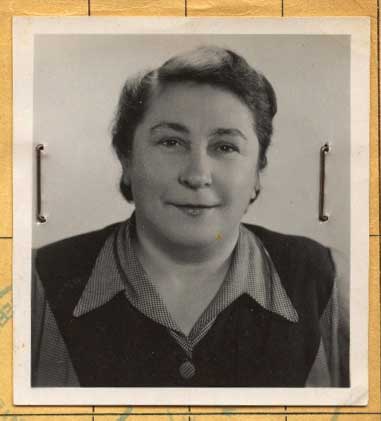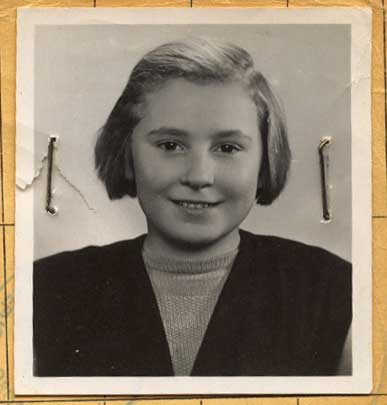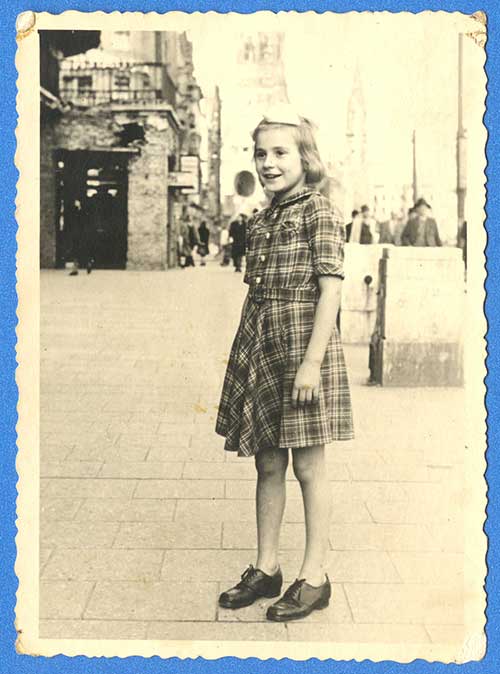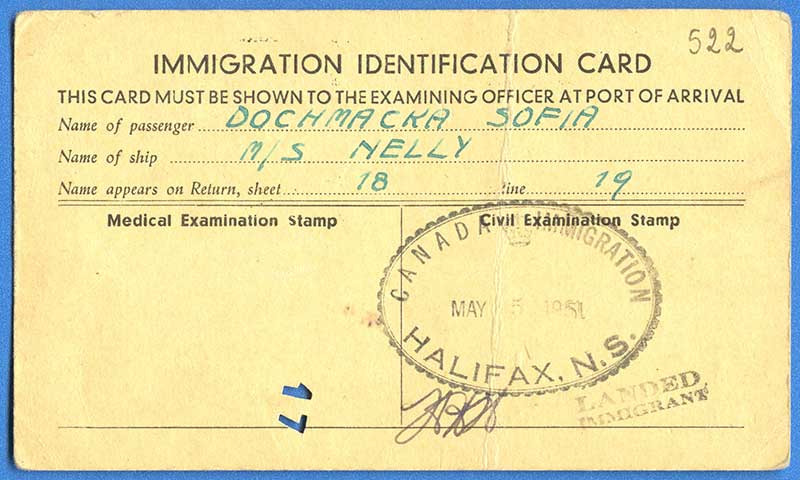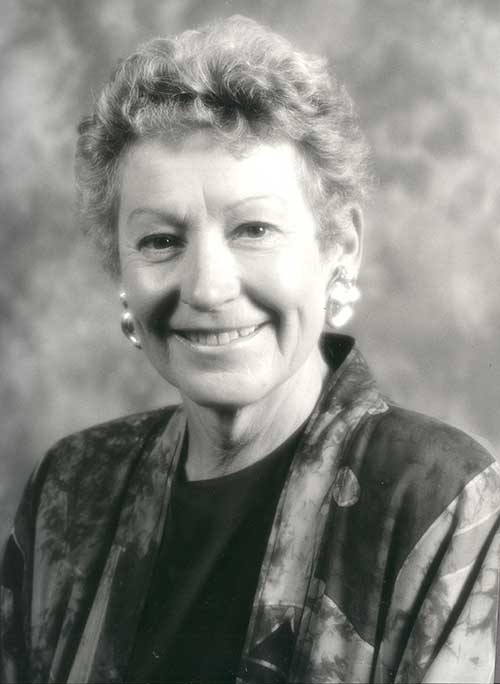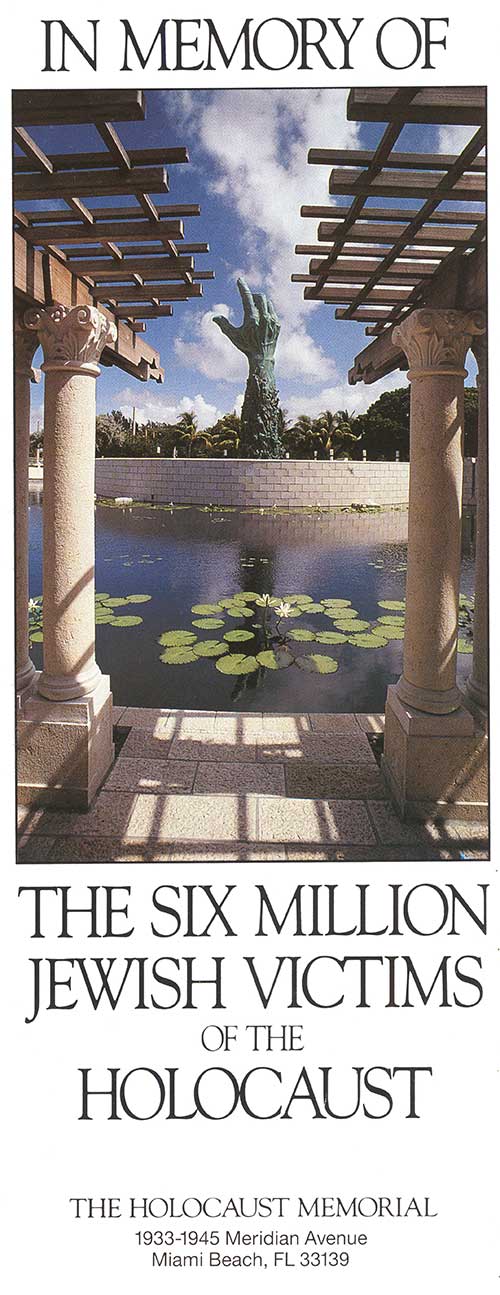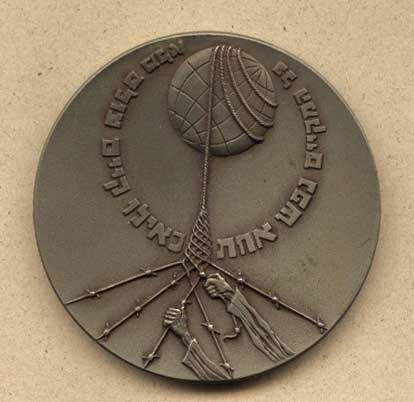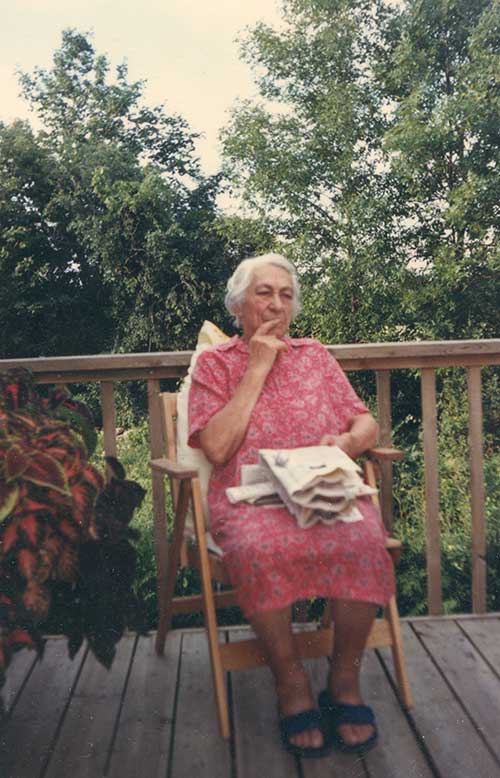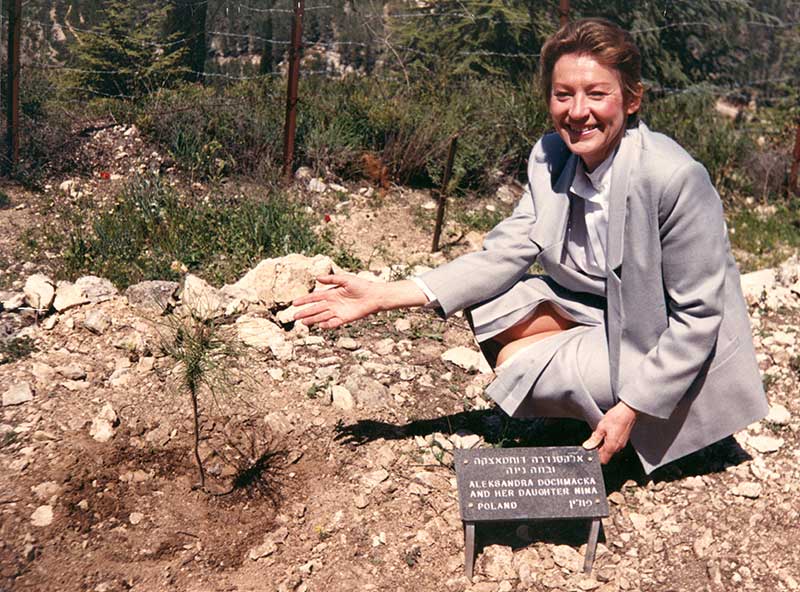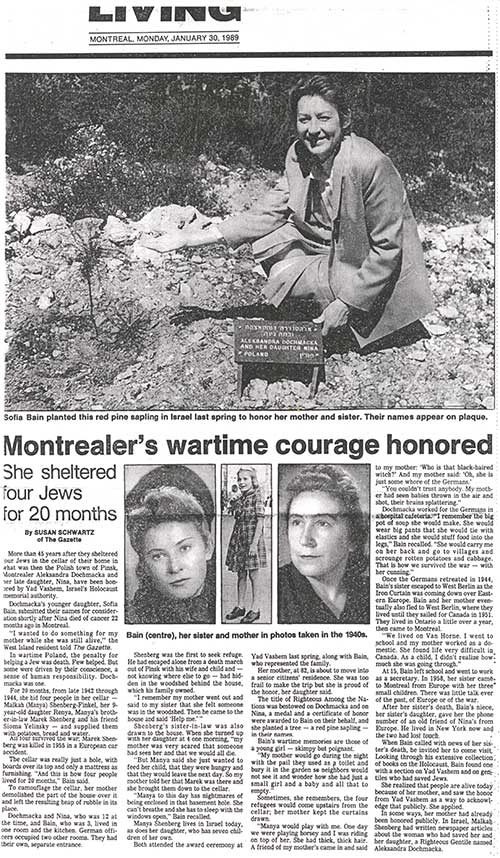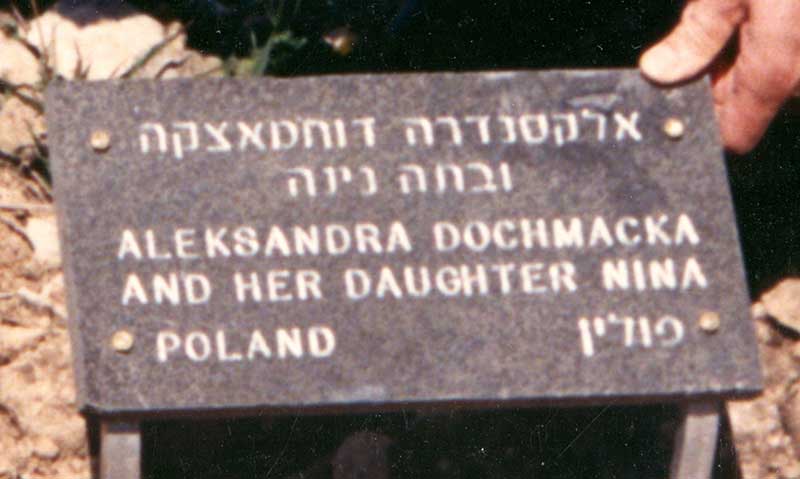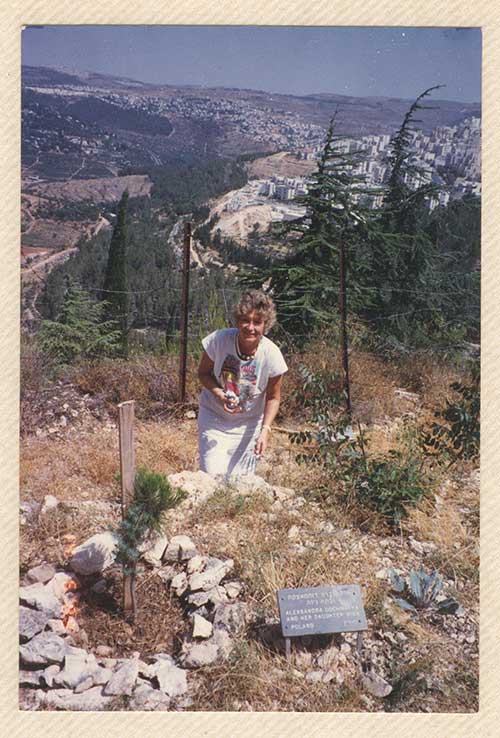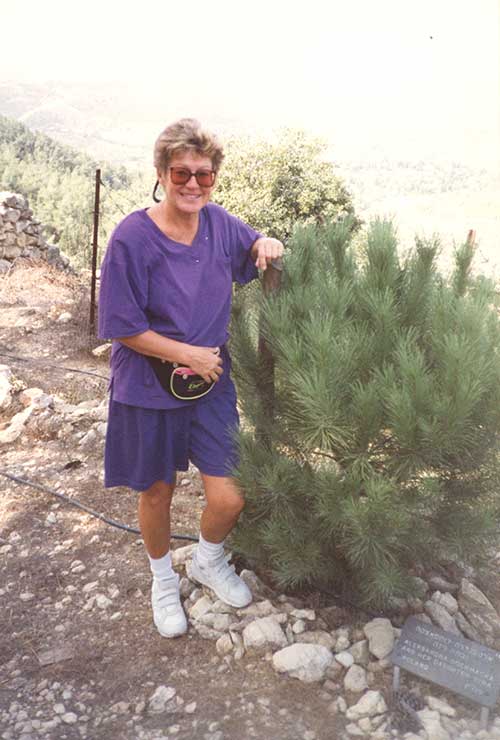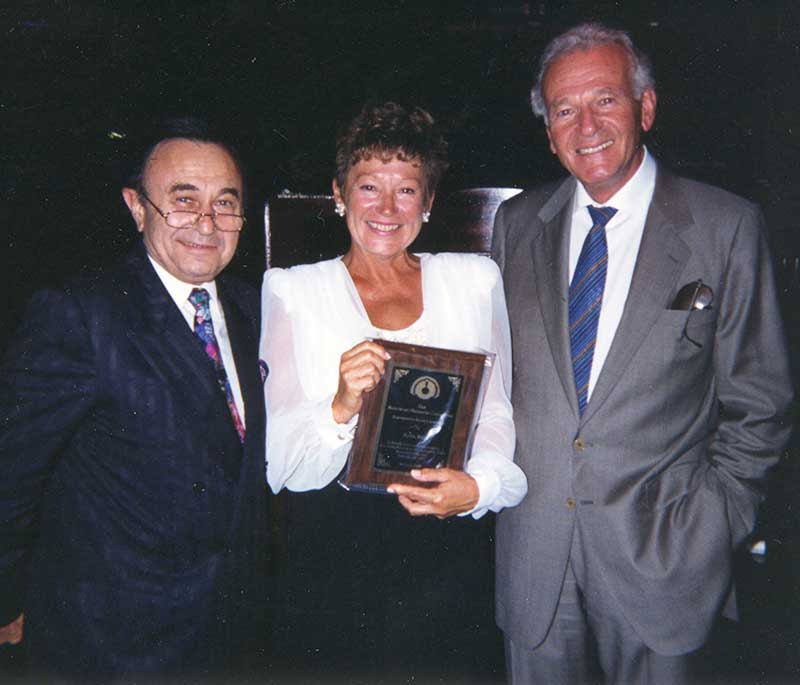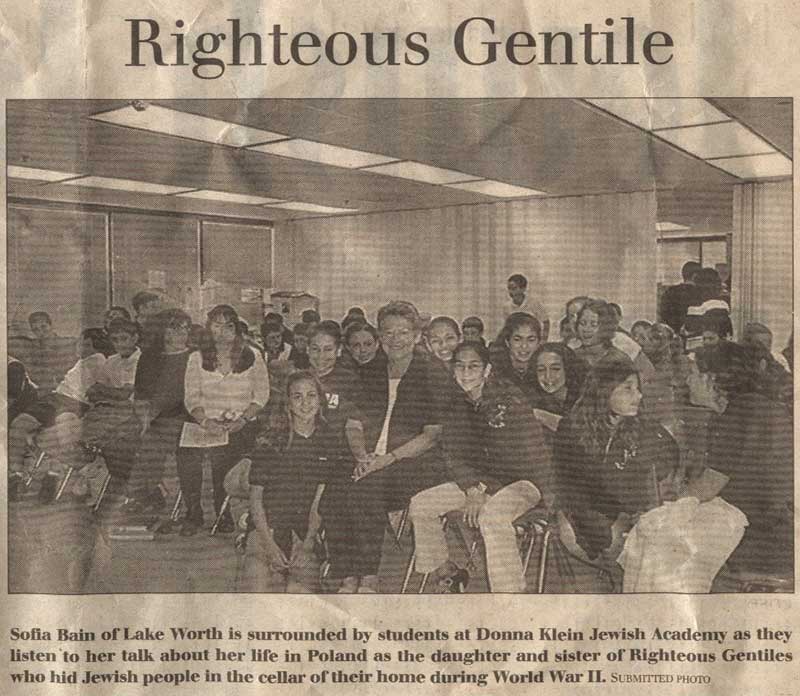Sobey Wall of Honour
Column
102
Row
11
Sofia Dochmacka Bain
Polish Immigrant and Righteous Gentile
Nelly May 5, 1951
Editors Note: Transcription of a talk given by Ms. Sofia Dochmacka Bain
I am very proud, that Dr. Dehav invited me here today, so, that I will have the opportunity, to tell you about two brave people, my Mother, Alexandra, and my sister, Nina.
I know, you have been studying about the horrible years in Jewish history - the Holocaust and the unspeakable and inhumane things that were perpetrated upon the Jewish People and others during that time period.
World War II, will be recorded in history, as the most cruel, the most horrible, brutal and bestial of all wars, a lesson to learn by mass murderers of any future age.
The destruction of Poland started on Sept. 1, 1939, when the German army invaded her, advancing across land, where Jews lived for over 800 years.
Rapid, though the German advance was, the Polish forces fought with skill and bravery at many points checking the German forces in series of fierce battles. During the fighting more than 60,000 soldiers were killed of whom 6,000 were Jews. Civilians by the thousands were also killed in bombed out cities. By the end of the brutal and savage assault of 3 weeks, more than 400,000 Polish soldiers were captured of whom some 61,000 were Jews. The Jews were immediately separated from the Polish, where thousands were denied basic rights.
On September 28, 1939, Poland was partitioned between Nazi Germany and the Soviet Union, while Lithuania annexed the Vilna area. Russians and the KGB took over our City of Pinsk, where there were 80,000 inhabitants, 35-40,000, of these being Jews. The Russians came in by tanks, airplanes and the city surrendered quietly. They had their own brutal way of dealing with their newly acquired populace. Russian became the only language and the Law, being compulsory in schools and daily life. Punishment was quick and severe, and people vanished into thin air. The population was quick in realizing that joining the Communist party would help their chances to survive and many Jews did this, also because of their higher educations, many were employed in high places, such as the Supreme Court, etc.
The Russians didn't have a long reign of terror, 1 year and 3 months, for on the 4th of July, 1941, 13 days after the German army had started its attack on Russia, the Germans arrived at the gates of Pinsk.
At 11:00 AM, in the morning, the first German airplanes appeared in the sky. The people on the streets ran in panic to their houses. The peasants hurried back to their villages from the market places. The Russian NKVS (The Commissariat of the Interior) hastily packed their belongings and sped in their cars across the bridge over the Pina River, a huge explosion was heard, it was that of the bridge being blown up by the retreating Russians, as well as several buildings on the edge of the town went up in flames, set by the Russians. The shells flew over the town in the direction of the Russians, and it was raining slightly.
The first Germans entered the town on motorcycles, behind them came cars draped in flags. The people welcomed them, believing they were being liberated.
To bring this to a more personal level, I was born April 27, 1940, when I was about a year old, my father and his 3 brothers had to join the Russian army, navy, and he said goodbye to us at the train station, leaving my Mother, then 34 years old, and my sister, 11. They never returned. With the exception of my mother's only sister, we had no one to turn to.
When the Germans marched in they started their killing immediately, by grabbing 16 young Jewish men from their homes and taking them away, not to be seen alive again. The pretext was, the someone shot at the Germans, which was not true. The Jews were ordered to hand in their radios, personal belongings and were beaten mercilessly, mocking them at their own pleasure to the joy of the Polish and Russian inhabitants, who were happy to get rid of the communists. They also took whatever they liked from Jewish homes, looting them and putting a mark on the doors.
The Polish Police was trained by the occupation forces during the first days and enthusiastically assisted the Germans in their plundering, humiliating and denouncing the Jews. Old scores were being settled and the Communists, whether true or not were being pointed out, which is exactly what the Germans wanted the population to believe.
One month into the occupation, August 4, 1941, the slaughters started in earnest. Between 2-3,000 special soldiers were brought in for this project. The Einsatzgruppen, the Elite killers, being the groups, that were to make Europe, judenfrei. The S.S. detachment with S.S. marks on their sleeves and Death skulls on the helmets, dressed in black, armed with double-edged axes and were accompanied by bloodhounds and German shepherds. 300 young Jewish men were arrested and thrown into a cellar and shot.
August 5, 1941, 8,000 Jewish men, were lined in two long columns of five abreast. All valuables, were confiscated, all but 150 bridge builders who were sent home. The others, were told to march quickly, nearly on the run, on a hot and bright summer day, clouds of dust was raised by the thousands of thee people, with the Henchmen on horseback, motorcycles all around, this close packed column stretched for miles, after marching about 10km, or 4 miles out of town, there they stopped and were told to climb down into the roadside, shots were heard. The men, then, saw open pits, and the Germans with their hands on the trigger of their machine guns, so the men started running in panic, but this was anticipated and most were gunned down before they got anywhere. There were 14 huge pits waiting, the Jews, were told to kneel, undress, and crawl to the pit's edge. These people were then shot. During the night, the Germans and Polish police, came back and took Jewish boys of 12-13 years, about 300, to collect the bodies of those shot in their attempts to escape. After the job was done, they too were shot, except for two, to cover the pits.
The next day, women and children were running around looking for the men, only a few could be seen, a few doctors, the tradesmen and the leaders of the Ghetto. In 3 days, 11,000 men were murdered. They were the cream of the town's Jewish population, all the educated classes (except the doctors). This left the Jewish population broken and helpless. About 20,000 remained - the majority were women and children. Jews had to walk in the middle of the street and make way for any Gentile they met on the streets. All contact was strictly forbidden. Any Gentile caught giving a piece of bread or hiding a Jew, was punished by death. Hung up in the Town Square, with a notice "This Gentile, fed or tried to hide a Jew". Poland was the only country, where the populace had a death decree issued. And all had to attend the hangings. Nazi theory held that killing a Pole would "purify" the world's races, so they had no problem stringing up polish rescuers.
On October 30 and 31, was another major action. This Death March, consisted of some 8,000 Jewish People, when the Germans surrounded the large Ghetto, after dividing it, into two (the Larger and the Smaller) leaving the smaller Ghetto for the tradesmen. At first, they had the Jews march to the Karlin Cemetery, and kneel, from there, they were set on another journey, marching towards a village 4km (2miles) away.
It was another warm and bright day, they had to walk briskly, with neighbouring villagers, watching this with great ease, as the Jews approached the pits, they saw, before them corpses of victims thrown by the roadside torn by dum-dum bullets. As they neared the pits, once again, they were told to undress, lay their clothes down by order of the items. Before them, they saw corpses of Jews shot, face down, one upon the other, heads smashed. The murders began to push the naked Jews, into the pits beating them cruelly, furious with hatred forcing them to descend the steps cut out in the pits for that purpose, to lie down, on top of the dead and the writhing wounded, face down, and wait for the bullet in the neck. Out of the depths came the agonized wails of those whom the bullets had failed to finish off, at once. "They picked 50 Jews of those waiting for a murderous game", One Nazi, would stand before the unfortunate Jew, while another pushed him towards the first and a third, who had been waiting, hit the victim, in the back with a pick-axe, then pull it out, as the man fell to the ground. A beautiful girl who refused to undress had her clothes torn off her, her long black hair turned white in minutes. A witness, who survived, who was inside the pit, had this to add:
On the 2nd day of Action, he was sent to work in the pits at another village. All that day, they brought more Jews, forcing them to strip naked and kneel down. One German led each naked Jew to the edge of the pit; where another shot him in the head. Later, they had to lay out in rows all those who had been shot. When the German had emptied his pistol another was handed to him, with blood splattering his face and uniform. A survivor, also had to count and record the number of corpses. (a small group of Jews did this job for 4 days, and when he escaped, a Polish policeman, told his friend and protector, who was hiding him at that time, that during the first night of the Action he was mounting guard at the pits. All that night, the earth was heaving, as in waves, a stream of blood and white foam, was coming to the surface together with moans. This went on till morning, when the S.S. arrived and poured quicklime over the corpses. This policeman couldn't eat or sleep for a whole week.
On Dec. 23rd, 1942, the small Ghetto, was liquidated, while the Germans were getting ready to celebrate Christmas, some Jews escaped and at this time, this is where our story begins.
When the Communists were in power, they were occupying the bottom part of the house where we lived, when they left, my mother moved down, from where we lived, to occupy one room and kitchen.
When the Germans arrived, it was chaotic, two rooms were taken over, they had separate entrance from us, and the back part of the house, my mother broke up, resembling rubble, to prevent any other German to live there. In the cellar, there was a dug out pit, which had a mattress, and was covered with a plank, it was small, damp. My mother doesn't remember who dug this hole, except it was there, when we moved down.
One evening, my mother was fetching some wood and told my sister, she felt, as if someone was watching her in the dark, and there was. Marek Schejnberg, a neighbour, and also the son of the family who owned a lot of property in Pinsk, came out of the shed, where he was hiding under wood and he was also hiding in the now deserted back house, which once belonged to his family, but was taken over by the communists. He approached her and asked her to let him stay, he somehow, managed to escape the death march, which claimed all his family, including his wife and child. They were the aristocrats of Pinsk and Warsaw, and therefore, were killed immediately. My mother took him in, he told her, "it would be for a short while, until he would be able to join up with the partisans in the woods". He came in and hid in the cellar. A short while later, his sister-in-law and 8 year old daughter (who weighed 22kgs about 50lbs, Mania Shejnberg and her daughter were starving in the large Ghetto and finally she escaped seeking shelter, at 4:00am in the morning, exhausted, she decided to knock on our door. The dogs in the house started barking, my sister looked out the window and opened the door. My mother was terribly shaken and was afraid, this woman brought death to us all, but took her in, and it happened as I said, Marek's sister- in-law, her husband and brothers were all killed; now they shared the same dug out hole with one mattress.
A polish partisan man knew us and trusted us, asked my mother's assistance to save his Jewish friend, Sioma Yielinsky, he was very sick, and starving, hiding in a basement, with only a matter of time before the Germans would find him and kill him. They went out at night and practically dragged in this young man, who had to be nursed to health by feeding him with a spoon as he'd vomit, and as soon as he'd get better, they would go and join the partisans. In the meanwhile, our polish partisan, who helped us with food was killed and was terribly missed.
Somehow, the two men got some guns, and stole grenades from the soldiers, we were informed by some partisans, that it would be safe for them to go with these two men who came to get them, they started leading them into the forest. When the two men forced Marek and Sioma, to start taking off their clothes, they realized that they wanted to kill them and take their weapons, they fought for their lives, badly beaten and bleeding where Mania and Nina treated them for a long while. There were no further attempts to meet up with partisans. It appears, a paper was traced back to our house, and the Gestapo arrived to search for Jews. My sister, was at home at this time, and managed to place the rug over the cellar entrance, with the dog and her puppies. Here is a 12 year old girl, telling them, "she hated the Jews, and if they were here, she would give them to the Gestapo, they searched the house, but somehow, avoided the dog area, and finally giving up and leaving. When my mother returned, my sister, told her to leave with me, she was worried the Gestapo would come back for her, my mother left and hid out with me the night, watching for a van to arrive at the house, but none did, and we finally came home. It appears, that even at my early age, I knew of the dangers, this new family was in, and I was very serious, that when some children came to the house, and wanted to know what that room was, I told them, "not to go there, it was dirty, and it was where the chicken lived. Childhood was lost overnight, and especially for my sister, who had the responsibility and the care of four people, myself, and to provide for us all.
My mother was forced to work in the cafeteria of the hospital for the wounded German soldiers, who arrived from the Russian front, and while she breast fed me way into my twos, she cooked food and handed it to the German soldiers, this helped her in stealing food, grout, whatever, she would tie around her legs my father's pants and dump whatever she could to bring back to feed everyone. When she wasn't working there, my sister had to go and replace her.
My mother would take me on her back, and we would go to villagers and get potatoes, cabbage, whatever was possible, and this meant walking at least 10 miles.
While working in the cafeteria, she felt pity for the young German boys that had legs missing and she would give them extra food, and perhaps her life was saved. As one day an officer caught her with food and beat her terribly but somehow spared her life, as she was liked there. A small child helped I suppose, or maybe a miracle.
We also had to go into the town square to get water from the well, and take out the pail of human waste from the Jewish people, and bury it at night in the garden. We had an outhouse, but it would be suspicious how one woman and two children, had so much more waste. And if neighbours would have known, they would have betrayed her and we all would have been killed.
My aunt, was at a party and she stated: "Germany would lose the war", and someone reported her to the Gestapo, who picked her up she was brought to the pits and shot by the Ukrainian S.S. soldiers, who wore the same black uniforms, trained in Germany, but had different markings, to distinguish them from the Germans. When my mother holding me on her back, came looking for her sister, the Ukrainian soldier told her to go back, or she would meet the same fate.
When the Russians started advancing on the Germans, the Germans began evacuating the town, they were torching everything and the houses, shooting at any running people. The house we were in was torched as well, and we all seemed to run out in different directions. My mother, sister and I, jumped into an underground bunker with lots of other people. The rest hid in another earth bunker belonging to some Russian peasants, we stayed there for 3 days, when someone in German uniform lifted the potato sack with a rifle, and stared down at the dirty hungry bunch of people and children, it turned out it was a Russian paratrooper, who said, "we could come out". And what seemed to have been an overnight freedom from the savagery of the Germans, turned into another prison by the Russian Bolsheviks.
Life with the Russians wasn't easy, Mania fearing the Germans would return managed to get out with her daughter and found her way to Israel. Where she lived until 1992, when Iraq's scud missiles landed in Israel, she died of a heart attack. Renia, married, had seven children, one set of triplets, one set of twins, and two others. They have now children of their own. Renia lived in Hadare, some live in Pardes Chana, Tel Aviv. Arik and Szimszi, twins, one is an Israeli pilot, it takes a $1 million to train a pilot, Szimszi, is an officer with the Golani army, I attended his graduation in The Negev.
While we escaped through towns, villages, and finally smuggled into West Berlin where I stayed with my sister, my mother joined us a year later, as the iron curtain came down, and I was smuggled in a boat, under coal, when the Russian patrol boarded the boat, I heard dogs barking, they didn't find me. When my mother came over, she was nearly suffocated, as she was hidden behind the boiler. Berlin was a bombed out city, and the International Refugee Organization, run by the American Army was processing people, my mother and I, were selected for Canada, my sister arrived in 1958.
We left Bremenhaven Harbor, on a small boat, the SS Nelly, weighing 3,500 tons, a rust bucket, and arrived on May 5th, 1951, landing in Halifax, N.S. we were taken to barracks, then the train and went to Ajax, Ontario.
We didn't talk about the war too much, especially to me, since we had no ppers, and nothing was told to me, but when my sister died at the age of 56, in 1987, I found an address book, with the name of the lady my mother saved, Mania, where they went to live in Israel, the old section of Tel Aviv. Someone going there, found her, living on Nordau and Ben Yehuda, near the Mediterranean Sea, and I went to visit her. She was telling me, how my mother had to take in the wash from the Germans covered in blood, and that Mania had to iron the shirts, they were so drunk and drugged up from the orgies of the days of killing, they didn't even know where they were. Except, someone was watching over us all.
Mania, her daughter, gave testimonies to Yad Vashem, a book has already been written about my mother's and sister's good deeds, and acknowledging 17 other Jewish survivors that were hidden for almost two years. Yad Vashem awarded my Mother and Sister, its highest honor, that of planting of a tree in the Avenue of the Righteous, a Medal and a Certificate of Honor.
After visiting the Holocaust Museum at Yad Vashem, you come away "overwhelmed and crushed, by what you see." Yet, as you enter the Avenue of the Trees, the valleys and the hills, you realize that every tree commemorates someone not Jewish who did not stand aside but risked his or her life, to save the Jews in their darkest hour. You can never forget the Holocaust Museum and the Trees.
Editor’s Note: Sofia volunteered at The Holocaust Memorial in Miami from 1990 to 2004 and speaks to school children about her family’s experiences and the horrors of the Holocaust. A tree has been planted in Israel to honour her family. Please see the images and clippings below.
